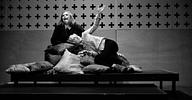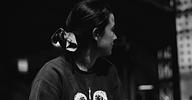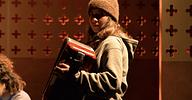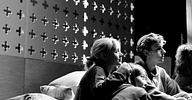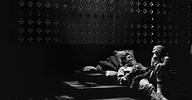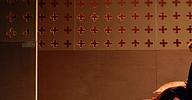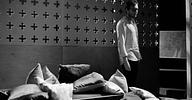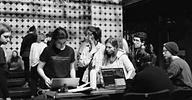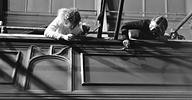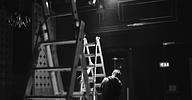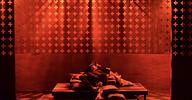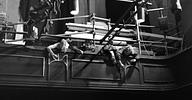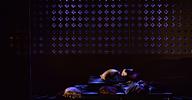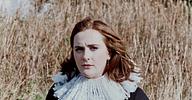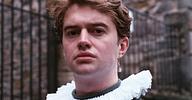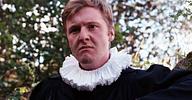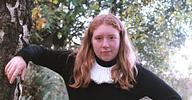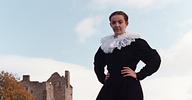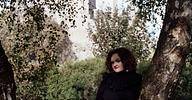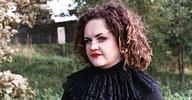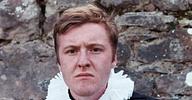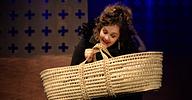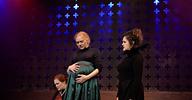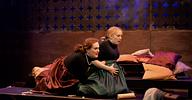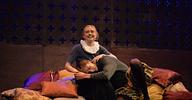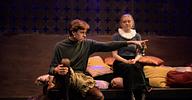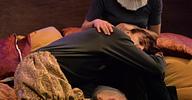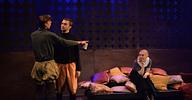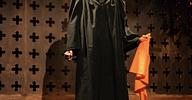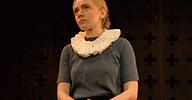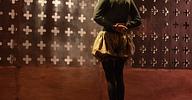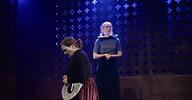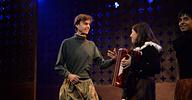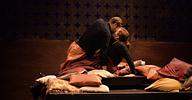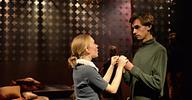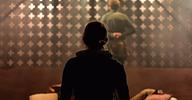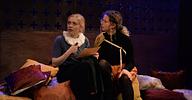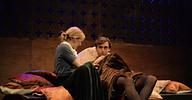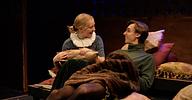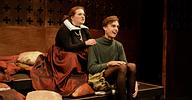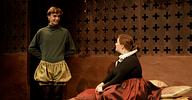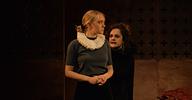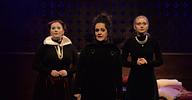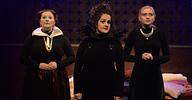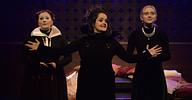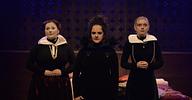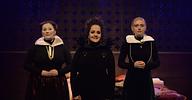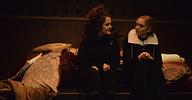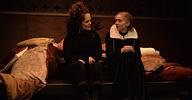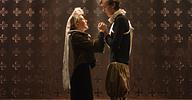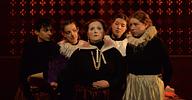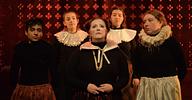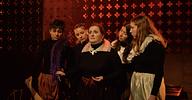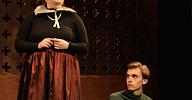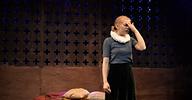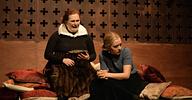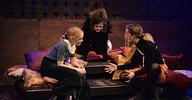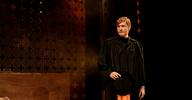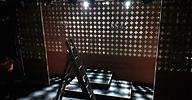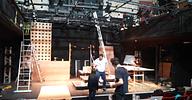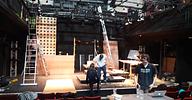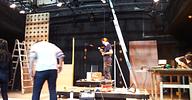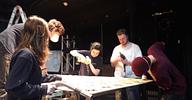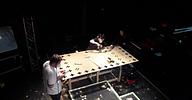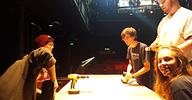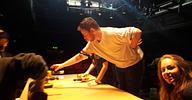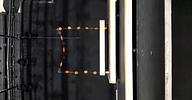Mary Queen of Scots Got Her Head Chopped Off
Cast and Crew
- Bothwell
- Jacob Baird
- Corbie
- Kirsten Millar
- Costume Assistant
- Megan Walker
- Costume Manager
- Katie Anderson
- Director
- Laura Hounsell
- Elizabeth I/Bessie
- Megan Lambie
- Ensemble
- Aude Naudi-Bonnemaison
- Ensemble
- Bella Charlton
- Ensemble
- Camilla Makhmudi
- Ensemble
- Priya Basra
- Lighting Designer
- Elissa Webb
- Mary QoS/Marion
- Eilidh Northridge
- Producer
- Ruby Sullivan
- Props Manager
- Amelia Cowen
- Riccio
- Dominika Ucar
- Set Manager
- Matthew Marsland
- Sound Designer
- David Jay
- Stage Manager
- Antonia Hall
- Tech Crew
- Nicholas Bush
- Tech Crew
- Antonina Dolecka
- Tech Crew
- Alvaro Herrera Seller
- Tech Crew
- Hazel Law
- Tech Crew
- Su Smee
- Tech Crew
- Mick Zijdel
- Tech Crew
- Lois Zonnenberg
Reviews
★ ★ ★ ★
Clear bright corbie
The EUTC bring a strong understanding and sense of purpose to this production of Liz Lochhead’s great 1987 play Mary Queen of Scots Got Her Head Chopped Off, at the Bedlam to Saturday.
Director Laura Hounsell has gone for clarity as Lochhead lays out her twin paths, her twisting story of Queens Mary and Elizabeth providing both a commentary on the role of women who rule and illuminating the myths on which modern Scotland’s concept of itself is founded.
Key to the whole production is Kirsten Millar’s bright Corbie, the crow, commenting with mocking sincerity on the brief passage of the cousins Mary and Elizabeth, queens of the two nations of a divided island.
There’s a great sense of inclusion from the start – get there early to borrow a blanket or grab a cup of hot toddy and hang out with the cast as they listen to a few tunes on the fiddle. And the whole thing is played out in front of a backdrop that looks like a Rood screen
Indeed, Matthew Marshland’s clever design that makes great use of the Bedlam space, allowing the players to come right out into the audience so they are, at times, addressing them directly from the front row. It is lit with a great sense of atmosphere by Elissa Webb.
Hounsell has created a well-balanced, gender-fluid ensemble, too. They work to ensure that the crowd scenes spread into the auditorium, including the audience as part of that crowd.
Millar’s Cawbie is no preening, dancing thing, in fact she is hardly birdlike at all in her physical performance. She is there as an Emcee, a potently articulate commentator to call out and highlight the decisions made by the two queens – particularly Mary – in her choice of men and political manoeuvres.
Her queens are well appointed, for the most part. Eilidh Northridge, tall and glacial, perfectly catches Mary’s tricky French accent – leavened with a coarse Scots. She has both a sense of femininity and a fierce tongue – a woman with the kind of natural power that has put the fear in men since forever.
Her interactions with Harrison MacNeil’s strong, vitriolic and emphatic John Knox are particularly enjoyable. Both actors get right into the dialogue, exploring the edges of the complex relationship between the two, tempered as it is with religion, gender, class and politics. Underlying it all is Knox’s exploitation of the fear of the other.
highlights
Jacob Baird also gets it right as Bothwell, the queen’s favourite who eventually became her husband. The arguments involving any two of these three are the real highlights of the production, and Hounsell must be credited with getting the ebb and flow of these spot on.
Megan Lambie stamps a more headmistress-like feel on Elizabeth. You wouldn’t want to cross her – or step in her path as she marched down a corridor – and Lambie ensures that this is a queen who clearly has a private life to which few of her subjects have access.
Both Lambie and Northridge also play the role of each other’s trusted maid-servant, which they succeed in doing seamlessly thanks to a neat trick with easily removable collars. In reality the cousins never met, but Lochhead’s doubling allows their ideas to be much closer in their conflict.
Lambie is particularly strong as Mary’s maid, Bessie. But where Hounsell has not got her actors completely up to speed is in Lambie’s monologues as Elizabeth when introspection tends to make her voice become so muted as to be inaudible.
best drunk acting
The rest of the company ensure that the telling is both clear and entertaining. Will Peppercorn brings his best drunk acting to the role of Darnley, with Domi Ucar keeping Riccio as enigmatic as necessary.
Ally Shilson’s music, performed live by Camilla Makhmudi and Robin Gage, adds a sense of the ceilidh to the show, while Priya Basra, Aude Naudi-Bonnemaison and Bella Charlton provide extra depth – and a pleasing play-within-a-play for the murder of Riccio.
As a whole, the production does not capture the sense of dissonance between England and Scotland as might be expected in the current political climate, although the echoes of a ruling elite wilfully ignoring the needs of the northern nation are certainly there.
Nor does Lochhead’s use of the playground taunting and rhymes in the final scene – from which she gets her title – appear as coherent to the whole as it could be.
However, there is still a great deal to unpick here. Notably the strong examination of the issues of women who have power and their relationships to the men around them.
Not, perhaps, the ground-shattering production it would like to be, but still one which goes well beyond expectation in its necessary dissection of one of society’s woeful failings.
Gallery
[ssba]
Spotted an error? Email us at archive@friendsofbedlam.co.uk and let us know.




